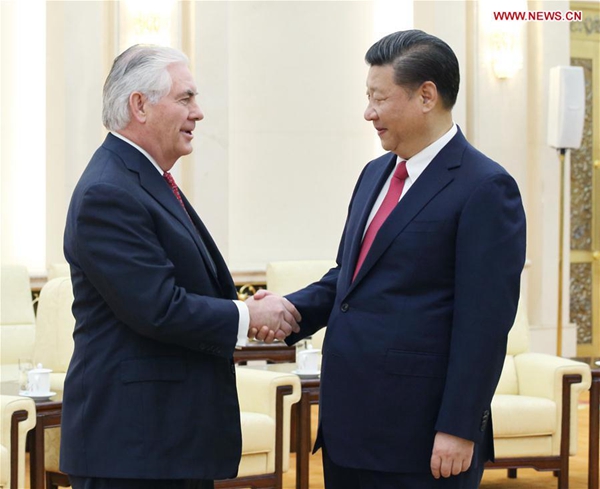Game theory and North Korea
china.org.cn / chinagate.cn by Sumantra Maitra, March 28, 2017 Adjust font size:
|
|
|
Chinese President Xi Jinping (R) meets with U.S. Secretary of State Rex Tillerson at the Great Hall of the People in Beijing, capital of China, March 19, 2017. (Xinhua/Yao Dawei) |
It's not often when you can see a perfect break in policy, other than during a conflict. Usually a policy is slowly phased out. However, American Secretary of State Rex Tillerson's visit to South Korea, as part of his Asia tour, proved different.
"The policy of strategic patience has ended," Mr. Tillerson was quoted as saying, in reference to the policy widely practiced under President Obama. It was a policy of waiting out North Korean nuclear programs, and waiting for the regime to feel the uselessness of its program under serious economic pressure.
That policy became controversial due to the fact that it couldn't be implemented properly, amid the rapid development of North Korean nuclear weapons.
Negotiations "can only be achieved by denuclearizing, giving up their weapons of mass destruction," Tillerson was further quoted as saying by New York Times. "Only then will we be prepared to engage them in talks."
He then visited China and met with President Xi Jinping, being told that, "The China-U.S. relationship can only be defined by cooperation and friendship." The resultant meeting was a welcome break from the troubling news cycle about China and U.S. and provides a more normal regular meeting than we've been accustomed to during the last couple of administrations.
Mr. Tillerson even states that U.S. would abide by the tenets of "non-conflict, non-confrontation, mutual respect and win-win cooperation," a phrase more often used by Chinese than American speakers, raising many eyebrows in the West.
His president, of course, was not as diplomatic or oratorical. He tweeted: "North Korea is behaving very badly. They have been 'playing' the United States for years. China has done little to help!"
How important is the Tillerson statement and his visits? The answer is not clear, and a lot depends on future actions. Prima facie, there's nothing new. The statement from Tillerson is a sign of vocal commitment that the region and American allies were expecting from United States, after a troubling few months.
Let's for a second forget about Trump's tweets. No sane person in Washington DC believes anything in the Far East could happen with keeping Chinese considerations in mind. Tillerson et. al. are astute enough to know that. The United States would be foolish to start a preemptive conflict in such a volatile region that might have such dire consequences.
Second, South Koreans are divided when it comes to brinkmanship and there is a serious opposition to THAAD even within Seoul, as any conflict would lead to a flattening of the southern capital by North Korean artillery regardless of the actual outcome of a war.
The question for the Americans to consider, therefore, is this: Are they willing to take the risk of an open ended pre-emptive intervention in a nominally nuclear armed state, with a geopolitical competitor and great power trade partner, right across the border, and a prospect of almost inevitable escalation?
I wouldn't think that's logical, given American experience in the last couple of decades with pre-emptive interventions.
The second question for Americans to consider is: Are they willing to enter into a grand bargain with China with regards to North Korea? If yes, then what are they willing to offer? Thoughts prevalent in the DC Foreign policy circles tend to revolve around the idea that the era of great power rivalry is back, and with it, comes an era of great power bargaining.
This brings us to the question for Chinese policy makers that is relatively straightforward, like Game Theory. What Chinese policymakers need to think of is where their best interests lie. On the one hand an erratic North Korea might lead China to war, and the prospect of a conflict right next door is, of course, hardly appealing.
However, given the unlikely event of a conflict, what happens then? What happens with the refugees, the escalation, and the fall of the North Korean capital? Will U.S. forces be then stationed in entire Korea right up to China's border?
Or without the threat of North Korea, will there be no U.S. forces in the peninsula or in Japan at all? These are of course all theoretical debates, and no one is advocating a conflict, but these are logical questions to ponder for any policy makers, given how volatile global politics is.
Finally, one needs to understand that not all of North Korean actions are erratic and irrational. North Koreans saw what happened to Gaddafi when he gave up his WMDs, and one can therefore understand the calculation they are making. In an ironic way, U.S. interference in Middle East has led to further militarization in other parts of the World.
One thing is for certain, nothing will happen in the region without Beijing and Washington jointly deciding the future. If any country, regardless of which side they are, acts too cavalier, or pre-empts anything, it would lead to disaster.
Sumantra Maitra is a columnist with China.org.cn. For more information please visit:
http://www.china.org.cn/opinion/SumantraMaitra.htm
Opinion articles reflect the views of their authors only, not necessarily those of China.org.cn.
